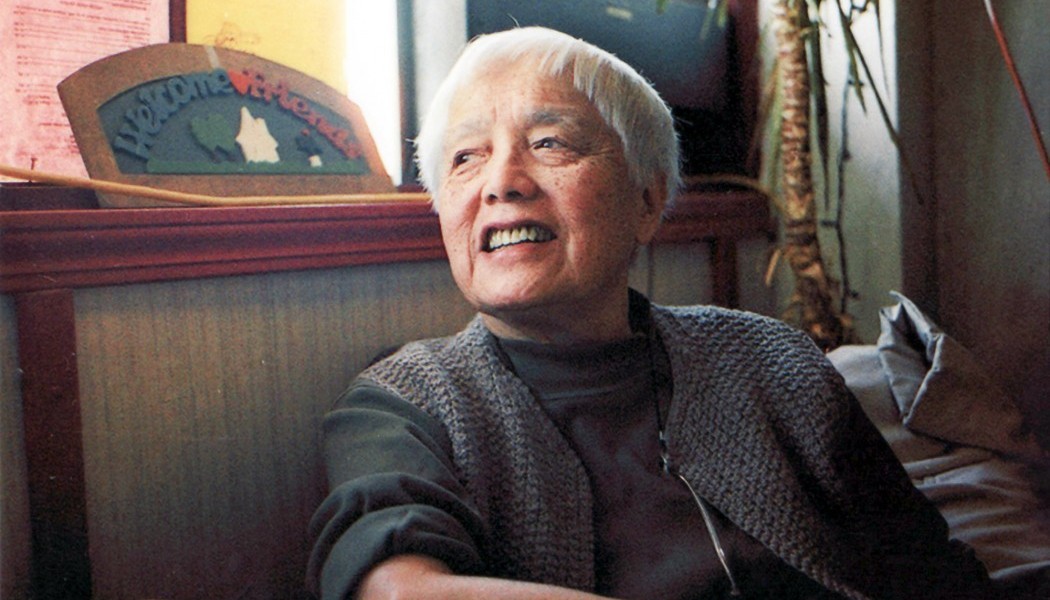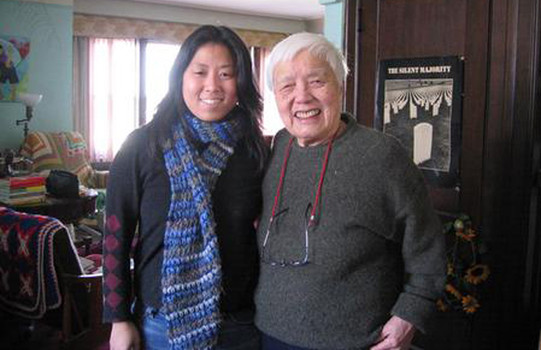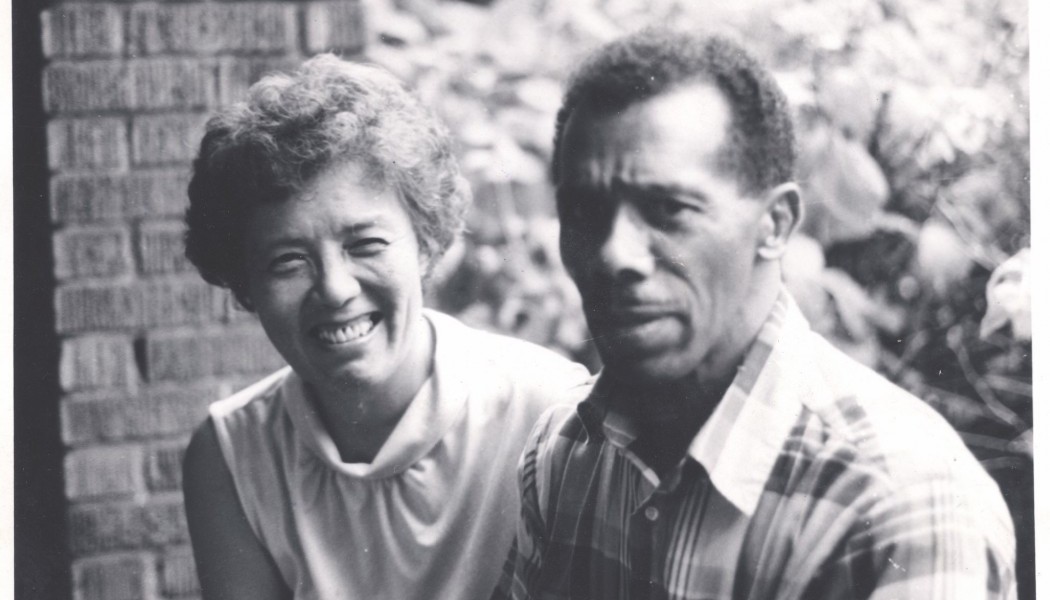 Back to selection
Back to selection
Filmmaker Grace Lee and Activist Grace Lee Boggs on American Revolutionary: The Evolution of Grace Lee Boggs
 American Revolutionary: The Evolution of Grace Lee Boggs
American Revolutionary: The Evolution of Grace Lee Boggs “I feel so sorry for people who are not living in Detroit,” says activist icon Grace Lee Boggs, as she stands before a dilapidated cityscape in the opening sequence of American Revolutionary: The Evolution of Grace Lee Boggs. A Marxist and lifelong Hegel disciple, the Chinese-American Lee Boggs gained notoriety in the Civil Rights and Black Power movements, alongside her husband Jimmy Boggs, in the mid-20th Century. Today, she is still ardently devoted to her adopted hometown of more than half a century, galvanizing the local communities in her effort to revive the industrial wasteland that has become of Detroit.
Filmmaker Grace Lee first began meeting with Lee Boggs in 2000, as part of her film The Grace Lee Project, though she quickly deduced Lee Boggs’ largely than life personal history needed its own canvas. American Revolutionary: The Evolution of Grace Lee Boggs premiered at the Los Angeles Film Festival, where it won the Audience Award for Best Documentary, screened at DOC NYC this past weekend, and will be released by POV in 2014. Filmmaker sat down with Graces Lee and Lee Boggs, albeit separately, to discuss the building blocks of revolution, and the future of Detroit.
Filmmaker: Initially, you approached Grace Lee Boggs to be part of The Grace Lee Project—your film that intended to refute the image of Asian-American women as passive and docile. How did those conversations evolve into American Revolutionary?
Grace Lee: I was working on that project, and I had heard about Grace Lee Boggs. Actually, I met her when I was a film student at UCLA, and she invited me to come to Detroit. So I came and was blown away, not only by her, but by the city, and her community. We were there just to speak about the “Grace Lee” concept, but she was so fascinating, we ended up staying for a week and just filming and following her. I knew then that I wanted to make a longer film about her. I didn’t know what that would be or when, but I continued to go back to Detroit every couple of years to check in with her. Fast-forward to 2008, I finished The Grace Lee Project and thought, okay, what documentary do I want to do next—oh, that Grace Lee Boggs film. So I called her up, and she said lets do it. We started filming more intentionally, and that evolved over the last three years to become American Revolutionary.
Filmmaker: So filming began in earnest in 2008, but there are also excerpts from those earlier meetings.
Grace Lee: Right. As we started editing, we realized that we had all this great footage from 2000, when Grace was much more active and mobile. When the themes started emerging about conversation, we decided to also use myself as a character.
Filmmaker: Grace is fairly adamant about not viewing herself as an icon in the Asian-American pantheon, because, in her day, as she says, there wasn’t a Feminist movement, and there wasn’t an Asian-American movement. When you began that dialogue with her in the context of The Grace Lee Project, how did she respond to such a classification?
Grace Lee: I think that she always likes to challenge you. She likes to make you think about categories, and I like that. Of course, coming of age in the era of identity politics, the thing you are most drawn to is, how did this Chinese woman end up in the Black Power movement? That’s what seems to be most unique and exciting. But really, she wasn’t thinking in terms of those categories, because she didn’t come of age during the Asian-American movement. After she wrote her autobiography, so many people came to know who she was. She is an Asian-American icon, whether or not she wants to be. It’s interesting how she shuns these labels, because it’s never been about her. It’s always been about these movements, and the other people. It’s not the evolution of Grace Lee Boggs, it’s the evolution of us.
Filmmaker: There’s an interesting scene towards the end of the film, when you sit down with her and ask her to reflect upon any inner struggle she may have had in advocating for and furthering these movements, and she kind of shuts you down. Do you feel like in order to be the force that she is, you have to be dealing with some sort of personal turmoil? Because for her, it seems to just be something she’s passionate about.
Grace Lee: Over the years, Grace has definitely revealed sides of frustration. I’m sure she’s experienced doubt and personal turmoil. I think she’s just of a generation that doesn’t talk about it. She refers to it early on in the film, when she says that she and [her husband] Jimmy didn’t talk about personal feelings—it doesn’t mean that she didn’t have them. I think she does reveal it a little bit when she says, “I’ve had more the life of a man than a woman.”

Filmmaker: And how she says that if she had children, maybe, it would have been different. She recognizes that.
Grace Lee: Right. She recognizes that she’s had a very special life. The way I interpret it is that she could have only had the sort of commitment to the movements if she wasn’t distracted so much by the personal.
Filmmaker: What is Grace’s daily life like? She has people into her home, and converses with them, and gives a lot of talks…
Grace Lee: It’s kind of just like that. That was one of the challenges about making a film with a 90-something year old woman. Most of her days are spent thinking and writing, and you know, talking to people. But I don’t think she’s as mobile when I first met her, we could barely keep up with her. People are always coming to her house, from all over the world, to meet with her and talk to her. She wakes up at 5:00 in the morning, she gets on her computer, and then she takes meetings.
Filmmaker: When did you put a cap on filming? When did you know it was done?
Grace Lee: I thought it was done several times. Before the scene where I confronted her about personal struggles, I’d done it before and never got anything, but I just thought, “I’ve got to try it one more time.” I didn’t go in meaning to confront her like that, but it just happened. Anyhow, I thought I was done, actually, in 2011. I was done filming, and Grace always says, “I’m not traveling anymore, I’m too tired.” Next thing I know, she’s going to Berkeley to have a conversation with Angela Davis in front of a thousand people, so I went to film that. But that was the last thing we shot.
Filmmaker: How do you go about picking and choosing what makes it in when you’re covering such an exhaustive life?
Grace Lee: I know. And not only that, but it’s a history of social movements in the 20th century.
Filmmaker: Because you have to contextualize it.
Grace Lee: Yeah, and we don’t have footage of her in these moments. In the end, we always came back to—this is a movie called The Evolution of Grace Lee Boggs, not the evolution of Detroit. Because it’s very tempting to talk about Detroit also. So, it always came back to how does Grace’s story, and her evolution, intersect with these historical events. It was a lot of test screenings. By nature of the film, we had to stop several times because we ran out of funds, which actually gave us time to reflect. When we would come back, we realized, “Oh, we don’t really need all of that information, because it’s not pertinent to her trajectory.” So that was really the guiding force.
Filmmaker: In the film, Grace places a lot of emphasis on evolving as a person, in order to properly realize a revolutionary movement. Do you have an opinion on that? Is it essential to realize change from the inside out?
Grace Lee: I think that’s one of the hardest things to do. It’s overwhelming, the amount of injustice in the world. Of course, there are all these structural problems in the world. Grace always says there’s no final struggle in the world, it’s not going to be over all of a sudden. So those reminders that it’s a process, and a constant evolution, have been helpful to me personally. Even in making the film.
Filmmaker: Grace, you say we can’t look to Detroit to evolve in historical terms, in a rejuvenation of the auto industry. So, in your mind, how will Detroit be able to realize its potential again?
Grace Lee Boggs: In the previous century, it was known as a site of industrial production, but in the next century, I think Detroit is going to be known for its community production. It’s already happening with 3D printers, it was written about in the Smithsonian Magazine, and everyone should read it, in order to get a sense of what the 21st century is going to be like. Our minds are so stuck in industrial production, we haven’t been able to understand how dehumanizing it is. Moving away from industrial production is actually an evolution of our humanity.
Filmmaker: So you think the solution lies in empowering communities?

Grace Lee Boggs: I think that the community is going to become the center of service. In the same way that the cities emerged out of the Middle Ages, communities are going to emerge out of this period.
Filmmaker: Don’t you think you’ve always been championing the notion of the community? Before your time, maybe.
Grace Lee Boggs: I think when people lived in agrarian societies, they had a relationship which was different from the one we have in cities, but I don’t think it was community one. It was more in terms of multi-generational, extended families. To begin thinking on those terms of different forms of relationships to become units of service is what we really have a challenge to do at this time. That’s why Detroit is so important historically, because it was so much the center of industrial production, and so admired for that, and it has collapsed. It’s marvelous. I have no idea how you create movements in a place like New York when it’s dominated by high rises. Movement is higher humanity, not higher buildings.
Filmmaker: And you say in the film that the reason you’ve been able to stay involved for so long is because you’ve been in Detroit for 55 years.
Grace Lee Boggs: I think so. I think it’s because Detroit has been in such transition. Even with the industry, it’s on a human level. It’s two family homes next to one another. I think that idea of community has to have a material base, and it doesn’t have one in New York. I don’t know how that’s going to happen here. When I was growing up in Queens, there were maybe 25 people on our city block. We all knew one another, but how do you know all the people on a city block in New York? How do you relate? You’re all walking so fast, trying to avoid one another.
Filmmaker: It’s true. There maybe aren’t the same neighborhood values as you’d get in Detroit.
Grace Lee Boggs: When I was growing up, if I made a wrong turn on 7th Avenue, the cops would know I was the daughter of Chin Lee. There’s some sense of knowledge of persons. I think it’s very hard to do that with these buildings. In Detroit, Myrtle knows that the woman down the street is in trouble, and she doesn’t need a research organization to come and tell her that. Detroit is really a small town. I’m baffled by New York, I have no idea what I’d do here.
Filmmaker: What, for you, is a successful day now? What allows you to feel like you’ve accomplished something during the day?
Grace Lee Boggs: You know, my life is very strange. I’ve become a bit of a celebrity, so people make engagements to come see me. So I have to think in advance, how I’m going to take advantage of it. I have to think about the day, and next year, and the year after that, when I’m not here. What do you do to prepare for that?
Filmmaker: I know you’re reluctant to view yourself as a celebrity, an Asian-American icon. Do you ever contextualize yourself in terms of a demographic, or has your identity always been secondary to the movement?
Grace Lee Boggs: I think for folks who are growing up today, the idea that Asian-Americans were almost invisible when I was growing up is hard to understand, because they’re all over the place now. When I was growing up, I had to keep my eyes glued to the screen so I could catch Anna May Wong—we were so invisible, we were exotic. I remember riding in the New York subway in 1944 when we first came to New York, and people would stare at us, and we would stare at their feet to make them embarrassed.
